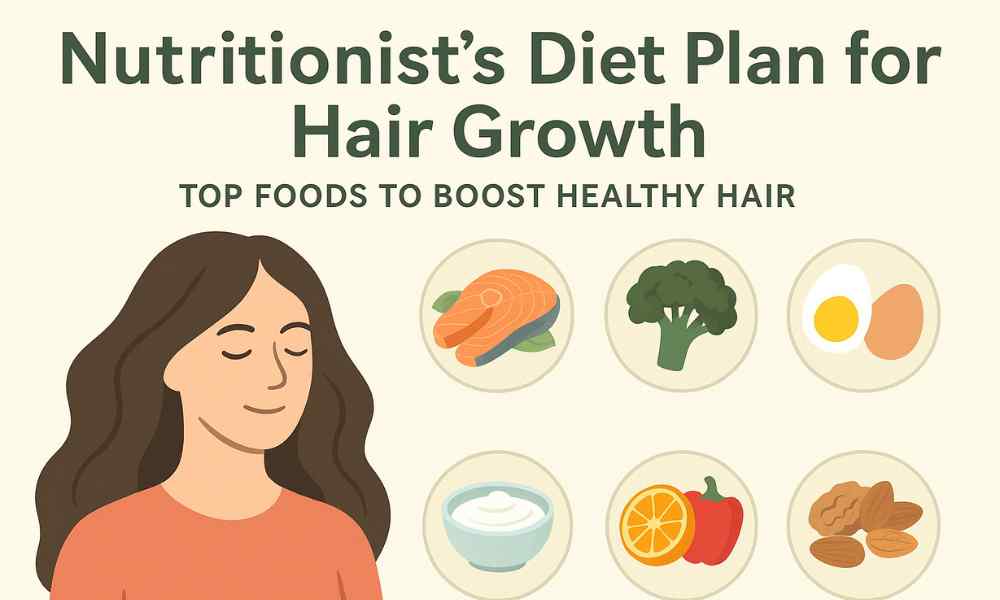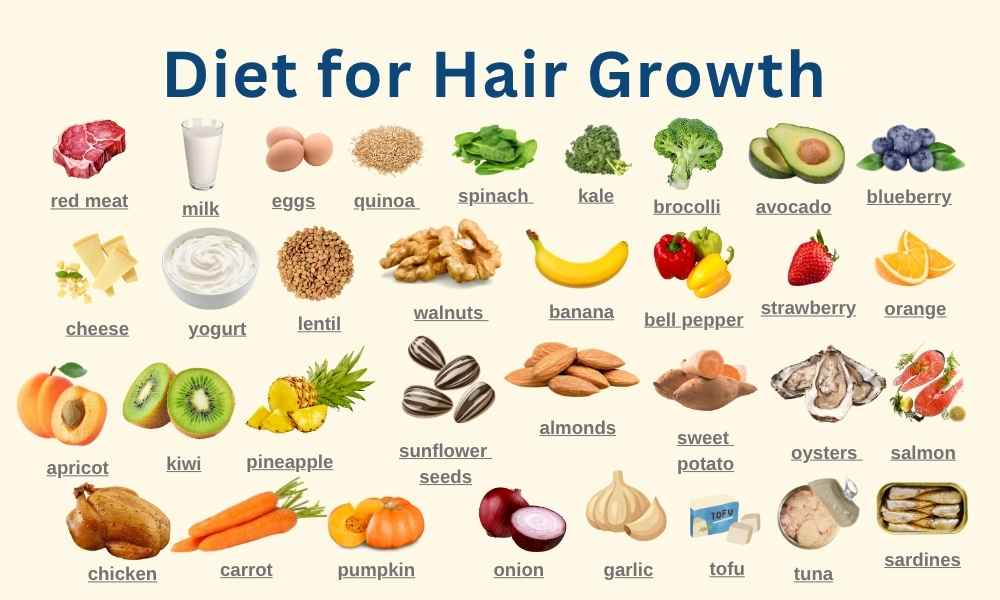A nutrient-rich diet plays a key role in maintaining healthy hair follicles and stimulating natural regrowth. By combining vegetables, protein sources, vitamins, and minerals, you can support thicker, stronger, and shinier hair over time.
Best Vegetables for Hair Growth
- Spinach
- Kale
- Sweet Potatoes
- Carrots
- Broccoli
- Bell Peppers
- Avocado
- Pumpkin
- Beets
- Tomatoes
Protein Sources for Hair Growth
- Eggs
- Chicken
- Turkey
- Salmon
- Tuna
- Greek Yogurt
- Cottage Cheese
- Lentils
- Chickpeas
- Quinoa
High-Quality Protein
Hair is mostly keratin, a protein. Inadequate protein intake or poor quality protein compromises hair synthesis. Prioritize lean meats, poultry, eggs, dairy (or fortified plant alternatives), fish, legumes, and soy products. Include protein at every meal to sustain amino acid supply for follicles.
Top foods: eggs, salmon, Greek yogurt, chicken breast, lentils, chickpeas, tofu.
Iron (and Ferritin) – Follicle Metabolism
Iron deficiency, even without anemia, is linked to diffuse hair shedding. Measuring ferritin (iron stores) is useful in chronic hair loss. Combining dietary iron with vitamin C boosts absorption.
Top foods: beef, lamb, oysters, spinach, lentils, pumpkin seeds, iron-fortified oats.
Vitamin D — Follicle Cycling
Vitamin D receptors in follicles regulate the hair cycle. Low levels are associated with several forms of hair loss. Sun exposure, diet, and supplementation can help normalize status.
Top foods: salmon, mackerel, fortified milk/plant milk, egg yolks.
Omega-3 Fatty Acids — Anti-Inflammatory
Omega-3s nourish the scalp, reduce inflammation, and may improve hair density. Regular oily fish or plant omega-3s support healthy follicle function.
Top foods: salmon, sardines, walnuts, chia seeds, flaxseed.
Zinc & Selenium — Antioxidant Defense
Zinc supports hair matrix cell proliferation; selenium protects against oxidative stress. Deficiency can trigger shedding, while excess intake can worsen hair loss.
Top foods: oysters (zinc), beef, pumpkin seeds, Brazil nuts (selenium — one or two per day is enough).
B-Vitamins and Biotin — Metabolic Cofactors
B-vitamins (B12, folate, niacin) support energy metabolism in keratinocytes. Biotin helps in deficiency states but high-dose supplementation is unnecessary for most people and may distort lab results.
Top foods: eggs, nuts, seeds, whole grains, legumes, leafy greens.
Vitamin C & Antioxidants — Collagen and Iron Absorption
Vitamin C supports collagen synthesis and enhances non-heme iron absorption. Antioxidants protect follicles from oxidative stress.
Top foods: berries, citrus fruits, peppers, cruciferous vegetables.
Practical Recommendations
- Eat a protein-focused breakfast (eggs, Greek yogurt, or legumes).
- Combine plant iron with vitamin C (spinach + citrus, lentils + peppers).
- Include oily fish twice weekly or plant omega-3s daily.
- Avoid crash diets and extreme calorie restriction.
- Use supplements cautiously — test before taking high doses.
Sample 3-Day Meal Plan
Day 1
- Breakfast: Omelette with spinach + whole-grain toast
- Lunch: Grilled salmon salad with mixed greens, orange slices, pumpkin seeds
- Dinner: Lentil stew with carrots and quinoa
- Snack: Greek yogurt with walnuts and berries
Day 2
- Breakfast: Greek yogurt with chia seeds and kiwi
- Lunch: Turkey and avocado wrap + raw bell peppers
- Dinner: Beef stir-fry with broccoli, bell peppers, and brown rice
- Snack: Brazil nuts (1–2) and an apple
Day 3
- Breakfast: Smoothie with spinach, banana, protein powder (or silken tofu), and flaxseed
- Lunch: Chickpea and roasted sweet potato bowl with lemon-tahini
- Dinner: Mackerel with steamed greens and roasted potatoes
- Snack: Carrot sticks with hummus
Supplements — When They Make Sense
- Iron: Only with confirmed deficiency; monitor for side effects.
- Vitamin D: Supplement when levels are low; re-check after 8–12 weeks.
- Biotin: Useful only in deficiency or after bariatric surgery.
- Multivitamin: Can cover small gaps, but avoid megadoses.
What Research Proves — and Doesn’t
- Correcting deficiencies improves density and reduces shedding.
- Supplements are not a cure-all for pattern baldness or autoimmune hair loss.
- Biotin helps mainly in deficiency; evidence in general use is weak.
Red Flags & Safety Cautions
- Sudden or patchy hair loss requires medical evaluation.
- Shedding after illness or dieting may be telogen effluvium — usually temporary.
- Excess vitamin A, selenium, or zinc can worsen shedding.
References
- Trüeb RM. Value of Nutritional Treatment for Hair Loss. PMC, 2021.
- Patel DP et al. A Review of the Use of Biotin for Hair Loss. PMC, 2017.
- ISHRS Patient Guide — Best Vitamins and Minerals for Hair Growth.
- Treister-Goltzman Y. Iron Deficiency and Nonscarring Alopecia in Women. PMC, 2021.
- Guo EL, Katta R. Diet and Hair Loss: Effects of Nutrient Deficiency and Supplement Use. PMC, 2017.

